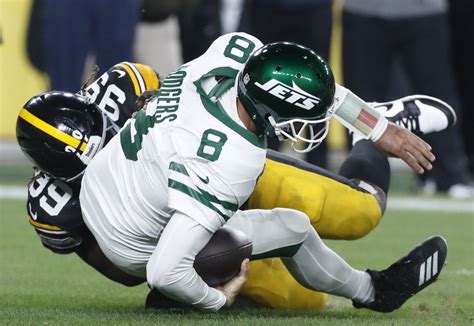
A potential pairing of Aaron Rodgers with the Pittsburgh Steelers, orchestrated by head coach Mike Tomlin, has been labeled “insanity” and a “nightmare” by former NFL quarterback and current analyst Boomer Esiason, citing concerns about Rodgers’ influence potentially undermining Tomlin’s authority and the Steelers’ established culture.
Boomer Esiason, a former NFL MVP and current CBS Sports analyst, strongly criticized the idea of the Pittsburgh Steelers acquiring quarterback Aaron Rodgers, arguing that such a move would be a disastrous decision due to Rodgers’ personality and potential impact on the team’s established culture and head coach Mike Tomlin’s authority. Esiason’s comments came amidst ongoing speculation regarding the Steelers’ quarterback situation following Kenny Pickett’s departure and the team’s pursuit of veteran options.
Esiason minced no words during a recent segment on WFAN, expressing his vehement opposition to the Steelers potentially bringing in Rodgers, who is currently with the New York Jets but whose future remains uncertain following an Achilles injury. “It would be insanity,” Esiason declared. “It would be a nightmare. I know Mike Tomlin thinks that he is all things to all people, but Aaron Rodgers would run that place. He would run that place, and Mike Tomlin would not know what hit him.”
Esiason’s primary concern centers on Rodgers’ reputation for being a strong-willed and independent player, someone who has often challenged coaching decisions and exerted considerable influence within his previous teams, particularly the Green Bay Packers. He fears that Rodgers’ personality could clash with Tomlin’s leadership style and disrupt the Steelers’ team dynamic. “Aaron Rodgers is going to call his own plays. He’s going to do what he wants. And Mike Tomlin is going to allow it, and then all of a sudden, you know, the inmates are running the asylum,” Esiason elaborated.
The comments from Esiason have ignited a debate among NFL analysts and fans alike, with many weighing the potential benefits of acquiring a proven quarterback like Rodgers against the risks of disrupting team chemistry and undermining the coach’s authority.
The Steelers’ quarterback situation has been a subject of intense speculation since Kenny Pickett was traded to the Philadelphia Eagles. While the team has added Russell Wilson, there’s still a question on whether the Steelers would acquire Rodgers or another quarterback to solidify the position. Coach Tomlin is under pressure to make the right move to maintain the Steelers’ competitive edge in a tough AFC North division.
Tomlin’s Coaching Style vs. Rodgers’ Personality:
Mike Tomlin has been the head coach of the Pittsburgh Steelers since 2007 and is highly respected for his leadership and ability to maintain a stable and winning culture. His coaching style is often described as player-friendly but firm, emphasizing accountability and discipline while also fostering a positive and supportive environment. However, some analysts believe that Tomlin’s approach might be too lenient to effectively manage a player like Rodgers, who is known for his strong opinions and willingness to challenge the status quo.
Rodgers, on the other hand, is known for his confidence and sometimes unconventional approach to the game. His talent is undeniable, but his personality has occasionally been a source of controversy. Throughout his career, he has shown a willingness to question coaching decisions and even deviate from the planned game strategy, leading to occasional clashes with coaches and teammates. Esiason fears that this tendency could create friction within the Steelers’ locker room and undermine Tomlin’s authority.
The Potential Impact on the Steelers’ Culture:
The Pittsburgh Steelers have a long and storied history of success, built on a foundation of strong leadership, teamwork, and discipline. The team is known for its close-knit locker room and its emphasis on collective goals over individual achievements. Esiason worries that adding Rodgers to the mix could disrupt this established culture, potentially creating divisions within the team and undermining the sense of unity that has been a hallmark of the Steelers’ success.
“The Steelers have always been about team,” Esiason said. “They’ve always been about playing together and supporting each other. Aaron Rodgers is about Aaron Rodgers. He’s a great player, no doubt, but he’s not a team player in the same way that Ben Roethlisberger was or Terry Bradshaw was.”
Alternative Perspectives:
While Esiason’s concerns are valid, some analysts argue that the potential benefits of acquiring a quarterback like Rodgers outweigh the risks. They point to Rodgers’ exceptional talent and his ability to elevate the performance of those around him. Some believe that Tomlin is a strong enough leader to manage Rodgers’ personality and harness his talent for the benefit of the team.
“Mike Tomlin is one of the best coaches in the NFL,” said ESPN analyst Stephen A. Smith. “If anyone can manage Aaron Rodgers, it’s him. He’s got the respect of the players, and he knows how to get the best out of them.”
Others argue that the Steelers need to take a risk to compete in the increasingly competitive AFC. With teams like the Kansas City Chiefs and the Cincinnati Bengals dominating the conference, some believe that the Steelers need to make a bold move to close the gap.
The Steelers’ Current Quarterback Situation:
The Steelers’ quarterback situation has been in flux since Ben Roethlisberger’s retirement in 2021. Kenny Pickett, who was drafted in the first round in 2022, was initially seen as the team’s quarterback of the future, but he struggled to consistently perform at a high level and was traded to the Philadelphia Eagles.
The team has since signed Russell Wilson, a veteran quarterback with a Super Bowl ring, to a one-year deal. Wilson is expected to be the team’s starter in 2024, but his long-term future with the team is uncertain. The Steelers also have other quarterbacks on their roster, including Mason Rudolph, but none of them are seen as sure-fire starters.
Rodgers’ Injury and Future:
Aaron Rodgers’ future in the NFL is also uncertain following a torn Achilles tendon he suffered early in the 2023 season. While he has expressed his desire to return to the field, it is unclear how effective he will be after such a serious injury. At 40 years old, Rodgers is also nearing the end of his career, which raises questions about his long-term viability as a starting quarterback.
The Financial Implications:
Acquiring a player like Rodgers would also have significant financial implications for the Steelers. Rodgers is one of the highest-paid players in the NFL, and the Steelers would have to make significant adjustments to their salary cap to accommodate his contract. This could potentially limit their ability to sign other key players and weaken the team’s overall depth.
The Potential for a Short-Term Boost:
Despite the risks, some argue that acquiring Rodgers could provide the Steelers with a short-term boost, potentially leading to a Super Bowl run. Rodgers is a proven winner, and his talent could elevate the performance of the entire team. However, this approach would also be a gamble, as it would require the Steelers to mortgage their future for a chance at immediate success.
Other Potential Quarterback Options:
While Rodgers has been the subject of much speculation, there are other potential quarterback options that the Steelers could explore. These include free agents like Ryan Tannehill and Carson Wentz, as well as potential trade targets like Justin Fields. Each of these players has their own strengths and weaknesses, and the Steelers would need to carefully evaluate their options before making a decision.
The Importance of Team Chemistry:
Ultimately, the Steelers’ decision on who to acquire at quarterback will depend on their assessment of the player’s potential impact on team chemistry and culture. The Steelers have always valued teamwork and unity, and they will be wary of bringing in a player who could disrupt that dynamic.
Conclusion:
Boomer Esiason’s strong criticism of the idea of the Steelers acquiring Aaron Rodgers highlights the potential risks of such a move. While Rodgers’ talent is undeniable, his personality and potential impact on the team’s culture are legitimate concerns. The Steelers will need to carefully weigh the potential benefits against the risks before making a decision that could have significant implications for the team’s future. The Steelers decision will need to weigh the short term upside of acquiring a highly talented player such as Rodgers against the potential cultural and team dynamic risks. As the Steelers search for a way to maintain their winning ways, the situation is complex and requires careful consideration. The team will need to consider all options to find the best fit to compete in a tough AFC North Division.
Expanded Analysis:
The core of Esiason’s argument is the clash of cultures. The Steelers are renowned for their stability, discipline, and a “team-first” mentality instilled over decades by coaches like Chuck Noll and maintained by Tomlin. This approach emphasizes collective achievement over individual stardom. Rodgers, while immensely talented, has often been perceived as an individualistic player who demands significant control. This perception, fueled by his tenure with the Packers, where he reportedly had input into personnel decisions and play-calling, raises concerns about his fit within the Steelers’ structured environment.
The dynamic between a coach and a quarterback is crucial for success in the NFL. A healthy relationship involves mutual respect, open communication, and a shared vision. Tomlin, known for his player-friendly approach, allows his players a degree of freedom but ultimately maintains control. Esiason fears that Rodgers’ strong personality and history of challenging authority could upset this balance, leading to a situation where Rodgers dictates the team’s direction, effectively undermining Tomlin’s leadership.
Furthermore, the Steelers’ locker room is traditionally a close-knit environment where veterans mentor younger players and everyone buys into the team’s ethos. The introduction of a high-profile, potentially disruptive personality like Rodgers could create divisions and resentment, especially if he is perceived as receiving preferential treatment or operating outside the established norms.
Esiason’s “inmates running the asylum” analogy is a stark warning about the potential consequences of losing control of the team’s culture. It suggests a scenario where the players, particularly Rodgers, dictate the team’s direction, undermining the coach’s authority and potentially leading to chaos and dysfunction.
However, it’s also crucial to consider the potential upside of acquiring a player of Rodgers’ caliber. He is a four-time NFL MVP and a Super Bowl champion with a proven track record of success. His talent could elevate the Steelers’ offense to a new level and make them legitimate Super Bowl contenders. Some analysts argue that Tomlin is a strong enough leader to manage Rodgers’ personality and harness his talent for the benefit of the team. They point to Tomlin’s ability to connect with players and his track record of success in Pittsburgh as evidence that he can handle even the most challenging personalities.
The Steelers’ decision on whether or not to pursue Rodgers is a complex one with significant risks and rewards. They must carefully weigh the potential benefits of adding a superstar quarterback against the potential consequences of disrupting their established culture and undermining their coach’s authority.
The article on Yahoo Sports also brings to light the Steelers’ somewhat uncertain quarterback situation, post-Roethlisberger. Kenny Pickett, initially pegged as the successor, didn’t pan out as expected, leading to the trade. The acquisition of Russell Wilson provides a veteran presence, but whether he’s the long-term solution remains to be seen. This backdrop adds another layer to the Rodgers speculation. Is Rodgers a viable option for the long term, or is he a high-risk, high-reward gamble for immediate contention?
Moreover, Rodgers’ injury history, particularly the recent Achilles tear, introduces additional uncertainty. Even if the Steelers were willing to overlook the potential personality clashes, his physical condition remains a question mark. At 40 years old, can he fully recover and perform at the same level he once did?
The financial implications are also considerable. Rodgers’ contract would require significant salary cap maneuvering, potentially limiting the Steelers’ ability to address other needs on the roster. This could create a situation where the team is heavily reliant on Rodgers’ success, with limited depth or flexibility to overcome injuries or other challenges.
The contrasting viewpoints on this potential move reflect the inherent uncertainty and risk involved. Some analysts believe that the Steelers need to take a bold step to compete in the AFC, which is dominated by young, dynamic quarterbacks like Patrick Mahomes and Joe Burrow. Others argue that the Steelers’ strength lies in their stability and culture, and that deviating from this approach would be a mistake.
Ultimately, the Steelers’ decision will depend on their internal assessment of Rodgers’ personality, his physical condition, and his potential impact on the team’s culture. They will also need to consider the other quarterback options available and weigh the risks and rewards of each. It’s a high-stakes decision that could shape the Steelers’ future for years to come.
Furthermore, beyond the immediate impact on the Steelers, the situation also speaks to a broader trend in the NFL – the increasing influence of quarterbacks and the challenges that coaches face in managing their star players. Quarterbacks are often seen as the face of the franchise, and their opinions and preferences can carry significant weight within the organization. This can create tension and conflict, especially when the quarterback has a strong personality and a willingness to challenge authority. The Steelers’ potential pursuit of Rodgers highlights the complexities of this dynamic and the importance of finding the right balance between empowering players and maintaining control of the team. The Steeler’s organization must weigh these factors carefully when considering their options at quarterback.
Frequently Asked Questions (FAQ):
Q1: Why is Boomer Esiason so critical of the Steelers potentially acquiring Aaron Rodgers?
A1: Esiason believes that Rodgers’ strong personality and history of challenging coaching decisions could undermine Mike Tomlin’s authority and disrupt the Steelers’ established team culture. He fears that Rodgers would exert too much control over the team, leading to dysfunction and a loss of the Steelers’ traditional emphasis on teamwork and discipline.
Q2: What are the main concerns about Aaron Rodgers’ potential impact on the Steelers’ culture?
A2: The main concerns revolve around Rodgers’ perceived individualism and his tendency to question authority. The Steelers have a long history of valuing teamwork and a close-knit locker room. Some fear that Rodgers’ strong personality could create divisions within the team, disrupt the existing chemistry, and undermine the sense of unity that has been a hallmark of the Steelers’ success.
Q3: What is Mike Tomlin’s coaching style, and how might it clash with Aaron Rodgers’ personality?
A3: Mike Tomlin is known for his player-friendly but firm coaching style, emphasizing accountability and discipline while also fostering a positive and supportive environment. Some analysts believe that Tomlin’s approach might be too lenient to effectively manage a player like Rodgers, who is known for his strong opinions and willingness to challenge the status quo. The potential clash lies in Rodgers’ desire for control versus Tomlin’s need to maintain overall team leadership.
Q4: Besides Rodgers, what other options do the Steelers have at quarterback?
A4: The Steelers have signed Russell Wilson to a one-year deal and he is expected to start. Potential free agent options could be Ryan Tannehill and Carson Wentz or trade targets like Justin Fields may be considered depending on their performance and availability. The team also has Mason Rudolph on their roster. Each option presents different strengths, weaknesses, and financial considerations.
Q5: What are the potential financial implications of the Steelers acquiring Aaron Rodgers?
A5: Acquiring Rodgers would require significant salary cap maneuvering, potentially limiting the Steelers’ ability to sign other key players and weaken the team’s overall depth. His high salary could restrict the team’s flexibility to address other roster needs, creating a situation where the team is heavily reliant on Rodgers’ success. The financial constraints would need to be carefully balanced against the potential on-field benefits.









